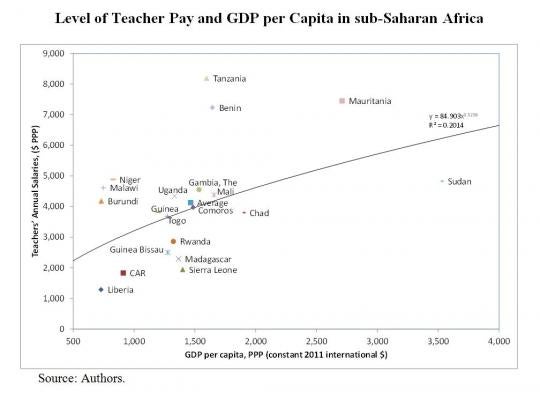This weekend marks the 20th anniversary of World Teachers' Day. Since 1994, the day, which is celebrated on October 5, has been an occasion to mobilize support for teachers. Teachers are not only tasked with imparting knowledge, they often have the power to inspire or suppress intellectual curiosity. Primary school teachers in particular help to lay the foundations upon which pupils’ attitudes towards education are built.
Are teachers happy with their job? Do they feel valued? If they were able to start over, would they choose teaching as a career? Are they satisfied?
Job satisfaction is known to have an impact on employee well-being, productivity, absenteeism, and turnover. Students may not reap the full benefits of education when teacher job satisfaction levels are low, or when teachers are plainly dissatisfied with their work or working conditions. Job satisfaction among teachers should be a major topic of concern not only for Ministries of Education, but also for children, parents, and societies as a whole. And yet, few national studies have been conducted in developing countries to capture the level of teachers’ satisfaction with their careers.
For eight years, UNESCO’s Pôle de Dakar has conducted research on teaching in Africa under its Teacher Initiative in sub-Saharan Africa (TISSA). In one of its latest TISSA reports, the Pôle de Dakar team released results of a survey of primary school teacher satisfaction in Uganda, many of which are striking and should be a source of concern for Uganda.
On a four-point rating scale, from very satisfied to very dissatisfied, slightly more than half of teachers were somewhat satisfied (44.2%) or very satisfied (8.6%). One-fifth of teachers (18.2%) were very dissatisfied, and 28.2% were somewhat dissatisfied. When asked whether they would choose to become a teacher again if they had the opportunity to start over, only 41.9% said they would. As to perceptions of other teachers’ satisfaction, less than one-fourth of teachers (22.3%) believed that their colleagues were satisfied.
Teachers were also asked what mattered most for their satisfaction. Surveyors listed eight major factors: professional recognition, opportunities for professional growth, interpersonal relationships/social activities with colleagues, salaries, benefits, working conditions, regular performance assessments, and the quality of head teacher leadership and supervision. More than half of teachers responding said salaries were the main factor affecting job satisfaction, but they also stated that other factors also played a role and deserve attention.
In addition, although the issue of timely payment of salaries was not considered in the survey, it is likely that part of teachers’ discontent in Uganda is related to the fact that they often do not get paid on time. The process of payments also appears to be vulnerable to corruption, including payments to “ghost teachers.” In order to address these issues, the World Bank Group is supporting the government’s introduction of an Integrated Personnel and Payroll System that should create a more efficient payroll system.
The above statistics suggest that satisfaction among primary school teachers is low, and that salaries play a key role in leading to limited satisfaction. It turns out that the level of pay for primary teachers in Uganda is about where one would expect it to be, in relation to the experience of other African countries.
As shown in the graph below, which plots average salaries for primary teachers in African countries against GDP per capita, Uganda ranks slightly above its expected salary level, given its level of development. If salaries matter for teachers in other countries, satisfaction levels might then be limited there as well. This would be bad news for children and families.

Uganda’s Minister of Finance, Maria Kiwanuka, announced a pay increase for teachers in her June 2014 budget speech. But whatever the right level of pay for teachers may be, depending on market and budgetary conditions, it is clear that teachers play an essential role in the future of nations. It is also clear – including in Uganda, according to our research, that job satisfaction affects the level of effort of teachers, and thereby education outcomes for children.
Teachers are vital for societies and should be properly recognized, not only financially but also in other ways. Recall that for about half of primary teachers sampled in Uganda, salaries were not the most important factor affecting job satisfaction – other factors also play a role, pointing to the need for comprehensive policies related to teacher motivation and satisfaction.





Join the Conversation